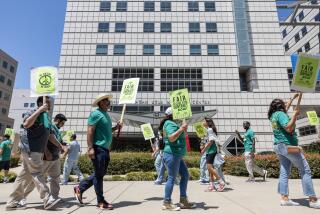UCLA Teaching Assistants Vote to Join Union
Graduate students who help professors shoulder the teaching load at UCLA voted Monday to join a union, setting in motion a labor movement likely to quickly encompass teaching assistants at seven other UC campuses.
University of California President Richard C. Atkinson said he will honor the wishes of the UCLA teaching assistants, who voted 718 to 269 to affiliate with the United Auto Workers.
The decision marks a historic turnaround for the university, which for 16 years has fought unionization of grad students--a position that led to the first systemwide strike of teaching assistants in December. The change comes after a labor board rejected the university’s arguments against unionization.
Atkinson’s staff and union activists will meet with state labor officials Thursday to schedule union elections for teaching assistants at UC campuses in Berkeley, Davis, Irvine, San Diego, Santa Barbara, Santa Cruz and Riverside.
If these campuses go the way of UCLA, the United Auto Workers will represent 9,000 teaching assistants, readers and tutors in the prestigious university system.
The union hopes that collective bargaining will lead to better health benefits, a fairer distribution of teaching loads, a more effective grievance procedure and a waiver of all graduate school fees for teaching assistants.
“This is a resounding victory,” said Connie Razza, a UCLA graduate student in English and a union activist. “With the university’s pledge to bargain in good faith, we have achieved our goal at UCLA. Now, we are looking forward to elections on other campuses.”
Unless the administration erects an unexpected roadblock, union organizers expect the teaching assistants, or TAs, at other campuses to join the union in the next few months.
They point out that 87% of graduate students statewide voted earlier this year to authorize the strike at all UC campuses, except for the medical school at UC San Francisco.
The strike, which started Dec. 1 just before final exams to cause maximum disruption, lasted four days. That’s when Assembly Speaker Antonio Villaraigosa (D-Los Angeles) and Senate President Pro Tem John Burton (D-San Francisco) brokered a 45-day cooling off period and a series of talks.
The negotiations went nowhere. But during that time the university lost a key ruling with the California Public Employment Relations Board regarding the teaching assistants at UCLA.
UC administrators argued that graduate student teaching duties are in effect an apprenticeship--part of their education for master’s or doctoral degrees--rather than a traditional labor relationship.
But the labor board said the students were entitled to collective bargaining and urged the university to voluntarily recognize their union.
When UC administrators asked for an appeal, the labor board turned them down.
UCLA’s teaching assistants are the latest to join the growing labor movement on college and university campuses nationwide. So far, grad students have won collective bargaining rights at 18 other universities.
Teaching assistants do the bulk of hands-on, small group teaching to freshmen and sophomores on UC campuses.
The official figures show that graduate students teach about 15% of the courses, but grad students say that figure underestimates their role at the large university where professors are rewarded more for research than teaching. They cite another university figure showing that their teaching efforts account for 60% of “contact hours” with undergraduates.
The Student Assn. of Graduate Employees, as the UAW affiliate is called at UCLA, will survey its 1,700 teaching assistants and tutors to determine what issues to bring to the bargaining table.
UC teaching assistants generally work about 20 hours a week for a nine-month academic year and receive an average stipend of $13,600 as well as health insurance and a discount on grad student fees.
Administrators are prepared to meet graduate students at the bargaining table as soon as it is convenient for both sides, said UCLA Vice Chancellor Wyatt R. Hume.
“We hope that our discussions about salaries and working conditions will be productive,” he said. “We hope the discussions don’t involve areas of academic quality, particularly who teaches which courses.”
Indeed, Atkinson reiterated that administrators and faculty will continue to control the content of courses, selection of professors and instructors, and the organization of academic programs needed to provide a high-caliber education for graduate and undergraduate students alike.
“The quality of their educational experience,” he said, “remains the university’s top priority.”
More to Read
Sign up for Essential California
The most important California stories and recommendations in your inbox every morning.
You may occasionally receive promotional content from the Los Angeles Times.










